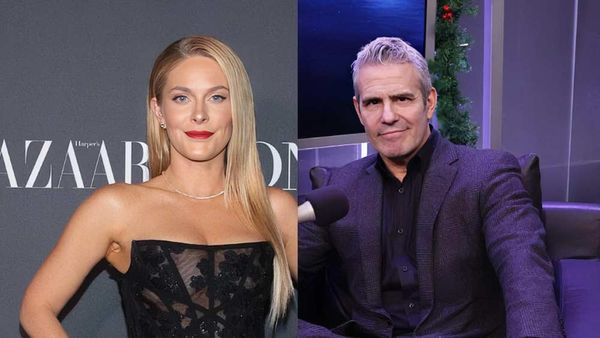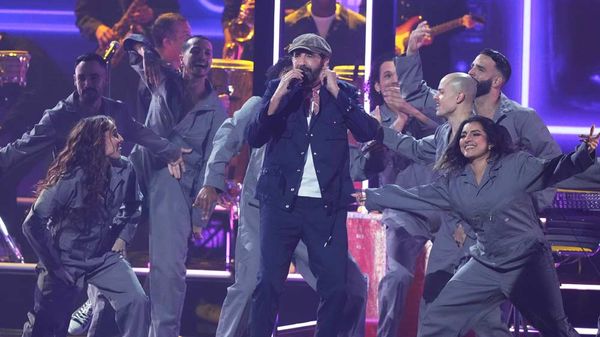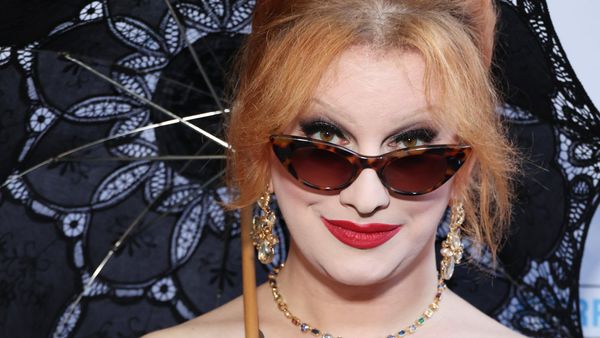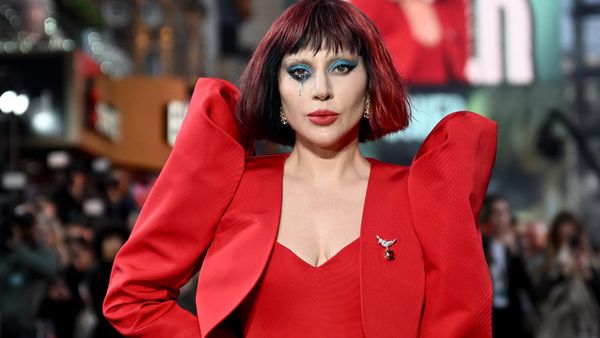
June 7, 2023
EDGE Interview: Eddie Gutierrez on Playing Che's Doppelganger in ART's Revisionist 'Evita'
Kilian Melloy READ TIME: 7 MIN.
You probably know at least one or two of the songs from the Tim Rice and Andrew Lloyd Webber musical "Evita," though you may not be familiar with the show itself or the historical figures and events it's based on. In brief, Evita Duarte, a poor young woman from the country, finds her way to Buenos Aires and pursues a career in show business. When she ends up involved with (and eventually marrying) Col. Juan Perón in 1944, the duo prove to be a potent mix; the colonel finds himself positioned to rise to the country's presidency, and Eva (or, Evita, as her legions of fans call her) brings both glamour and authenticity, her beauty and high fashion co-existing with her ability to connect with the common people. As the musical tells the story, Evita was a major force in helping sweep Col. Perón into power.
Evita was also a reformer, and that, too, endeared her to the people of Argentina – though, the musical depicts, the upper class and the military were both dismissive of her, assuming her to be a commoner and a gold digger. Evita died in 1952 of cancer, and the tragic circumstances of her death at the early age of 33 cemented her status as a kind of popular saint for many in Argentina, where she remains revered to this day.

Source: NIls Scott Studios
The character of Che Guevera represents the people of Argentina, but also voices a historical critique, wondering how much Evita accomplished for the common folk. Che crops up in various capacities throughout the story, commenting on events as they happen, while an ensemble literally gives voice to various segments of Argentine society – the workers, the military, and the wealthy elite. Counterpoints, harmonies, and a waltz between Evita and Che symbolize a tension, and the collaboration, between history and myth.
EDGE caught up with native New Yorker Eddie Gutierrez, a veteran of the show having been part of the ensemble during its 2019 run in New York, which was directed by Sammi Cannold. "It was only a week production. It was part of the New York City Center gala that they do every year," Gutierrez recalled, "and I had actually done the gala the year prior with 'A Chorus Line.'" When the American Repertory Theater in Cambridge decided to bring Cannold's production to their stage at the Loeb Drama Scenter in Harvard Square, they reached out to Gutierrez to reprise his role.
The openly queer actor revealed to EDGE the A.R.T.'s intriguing new spin on the character of Che, his own specific and novel role in the ensemble, and why, more than half a century later, so many are still so enthralled with Evita Perón.

EDGE: Had you been a fan of 'Evita' before this show?
Eddie Gutierrez: I had done it once before in California, and that was a very traditional staging based on the Hal Prince version. A lot of the choreography from that is in this version. That being said, this production is so very different – and I think that's something audiences are going to find as well. If they are familiar with the show going into it, they're going to experience something very different.
EDGE: Perhaps because of its origins as a concept album, "Evita" is more like an opera in certain ways. Does that change how you approach the material?
Eddie Gutierrez: It definitely requires a different approach. Much like "Jesus Christ Superstar" before, "Evita" functions as a rock opera, with the emphasis on the opera. It is fully sung through, and the vocals take center stage. It requires a different skill set. We don't have book scenes, like other musicals, where we take a break from the music. It just keeps on going.

EDGE: Being in the ensemble you probably have to play a bunch of different roles – villagers, military officers. Is there a role in particular you identify with?
Eddie Gutierrez: It's funny you bring that up. Like I said, this is a very different staging of this show. Not to give too much away, but I play a kind of new creation. Our director, Sammi Cannold, is attempting to weave Che into the story more. What I'm doing is depicting Che as a younger person in the story. As our main actor, Omar [Lopez-Cepero], who plays Che, is telling story and narrating, I am representing his younger self. I start as a worker, and I work my way up the military ranks. I work closely with Eva and Perón, and I experience what's going on in their regime and the fallout that comes from that. I have a very solid through line.
EDGE: Do you find that there is a particular song that you love?
Eddie Gutierrez: There's a song near the end of the first act called, "Perón's Latest Flame." It's a moment where the aristocracy and the military are both commenting on how Eva has wheeled her way into the higher ranks and into Perón's life, and how much they disdain that. Because it's these two different groups of society talking, there's two very different musical themes occurring at the same time. You get these highfalutin', fancy orchestrations occurring for the aristocracy, and you get these super-percussive, militaristic sounds for the military. It's exciting, because what's occurring is so different and keeps bouncing back and forth.
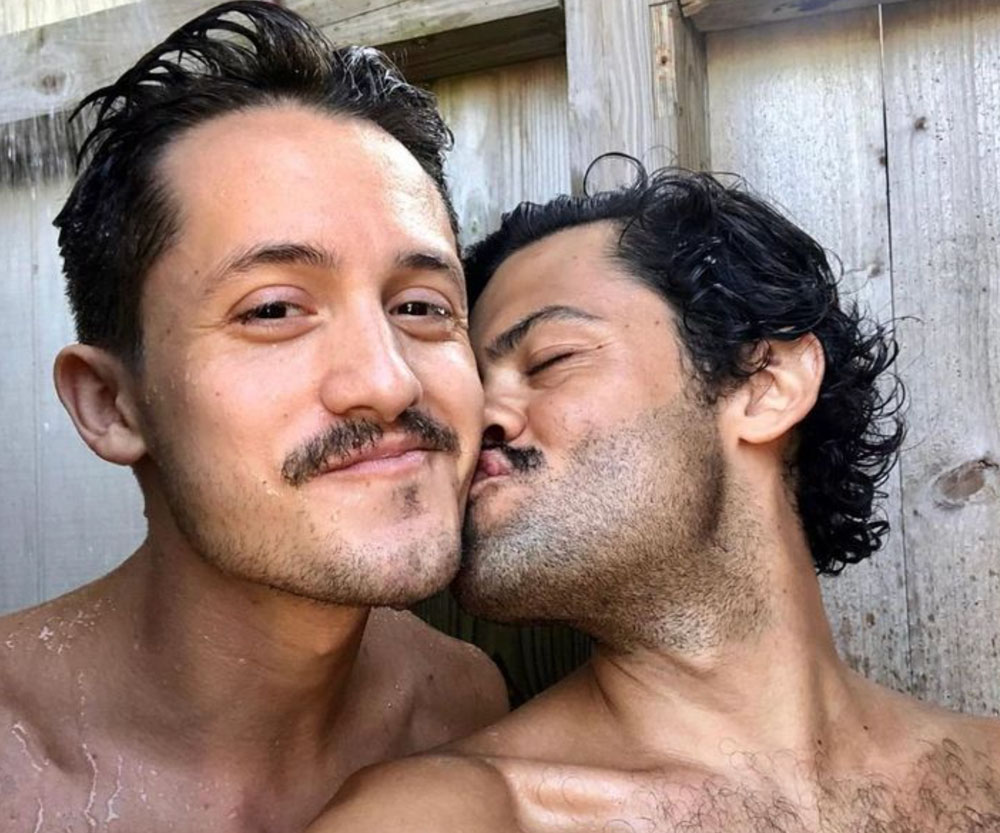
EDGE: Eva Perón is still revered in Argentina.
Eddie Gutierrez: She was an icon for the country because she came from the working class. She was an inspiration for people of the lower classes because she rose, and any sort of caste system is generally very hard to move up through, at least at that time.
EDGE: She's also something of an icon for the queer community.
Eddie Gutierrez: She's a powerful woman, and as a queer man myself, I think any figure who is a woman who has achieved power is very fascinating. It shows that there are alternatives to the traditional systems of patriarchy. And you see a woman who really had power who made a difference who, though she was very polarizing for many reasons, was making an impact in her society.
On top of that, one of the things that as a queer man I'm fascinated by is that she also used fashion in a very specific way. When we think of the musical, we think of these very specific looks, like the big ball gown in "Don't Cry for me, Argentina." These were looks that she would use on purpose to make sure that she was seen and that she was remembered. That's a fascinating way of using fashion and art to accomplish one's cause.
EDGE: There are these strands of dictatorship, high fashion and glamour, and religious sentiment running through Argentine society in the show. I feel like we're seeing that here in the States. Is it weird to be this production at this moment in American history?
Eddie Gutierrez: It really is. We staged this riot scene in the in the opening of our show, and you can't help but think of January 6. And we talked about voter suppression, we talked about embezzlement within the regime. All those things feel like they're mirroring what's occurring, or has occurred recently, in our own country. I think audiences are probably going to make that connection when they come and see it. It really does feel like it's reflecting a certain time that is reoccurring right now. I think there is a reflection of our time in the show, and it's why it'll feel so relevant for today.
EDGE: What would your dream role be if you could be leading man role in the musical of your choice?
Eddie Gutierrez: As someone who is an actor, a singer and a dancer, I think my dream role is Paul in "A Chorus Line" right now. That is a role that I love – an iconic queer character that really changed the game for how queer characters are represented in theater.
I'm very interested in telling queer stories, ones that deal with life nowadays. I'm just so happy that the kind of culture and atmosphere around telling your stories doesn't feel as stigmatized [as it once did]. When I started my career, it felt like a gamble to be an out actor, but I knew for myself that it was very important. I am a queer performer who wants to tell queer stories. That will always be a large part of my work. And also, [I'd like to do] something Latino. That part of my life is also very important to me, and I would love to incorporate the two. I think that intersection is very interesting. I hope more new roles are written that are like that, because I would love to tell that story.
"Evita" plays through July 16 at the Loeb Drama Center in Harvard Square. For tickets and more information, follow this link.
Kilian Melloy serves as EDGE Media Network's Associate Arts Editor and Staff Contributor. His professional memberships include the National Lesbian & Gay Journalists Association, the Boston Online Film Critics Association, The Gay and Lesbian Entertainment Critics Association, and the Boston Theater Critics Association's Elliot Norton Awards Committee.


